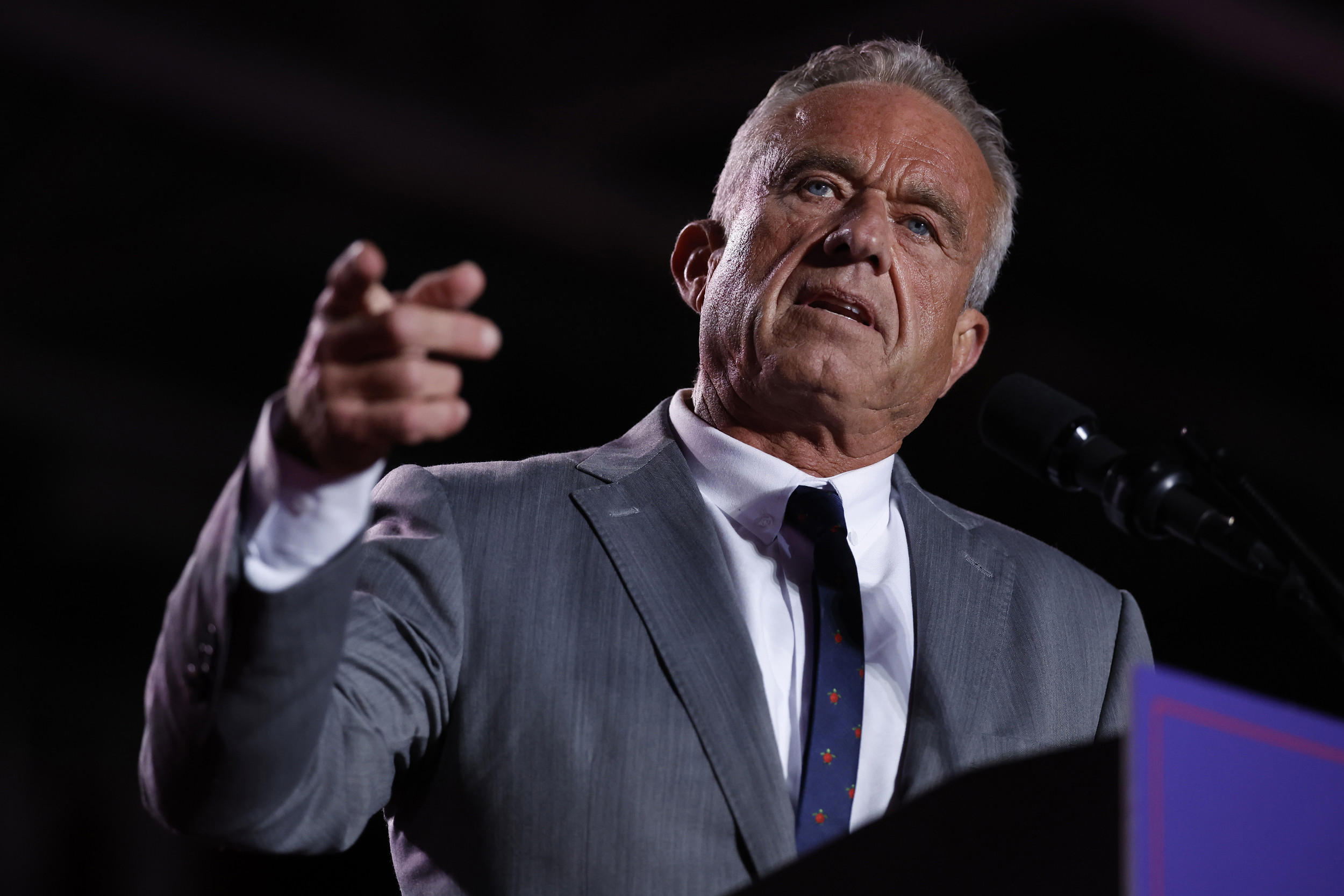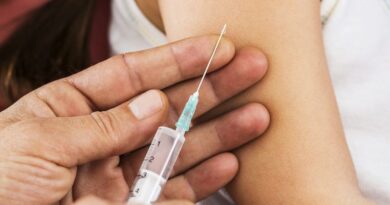Public Health Experts Groan as RFK Jr. Pitches Vaccines as ‘Personal Choice’

Public health experts are sounding the alarm about President-elect Donald Trump nominating Robert F. Kennedy Jr. as his pick to lead the Department of Health and Human Services.
Trump has rolled out a number of controversial Cabinet picks in the last few days, including Kennedy, whose vaccine comments has long sparked the ire of leading scientists and public health experts.
“The Safety and Health of all Americans is the most important role of any Administration, and HHS will play a big role in helping ensure that everybody will be protected from harmful chemicals, pollutants, pesticides, pharmaceutical products, and food additives that have contributed to the overwhelming Health Crisis in this Country,” Trump wrote in a Truth Social post announcing the nomination.
Kennedy has said he is not against all vaccines, but has been critical of vaccinations in the past. He is on leave as the chair of the anti-vaccine group Children’s Health Defense and has repeated the debunked claim that vaccines cause autism. He also told podcaster Lex Fridman that there are “no” safe and effective vaccines, breaking from the overwhelming scientific consensus.
He has said he would not ban vaccines if confirmed, previously telling MSNBC that “if vaccines are working for somebody, I’m not going to take them away.”
“People ought to have choice and ought to be informed by the best information, so I’m going to make sure that scientific safety studies and efficacies are out there and people can make individual assessments about whether that product is going to be good for them,” Kennedy said.
The problem with that line of thinking, according to public health officials who spoke to Newsweek, is that it does not take into account that for vaccines to be effective at scale, a significant portion of a population has to be immunized in order for that population to develop “herd immunity” from a disease.
Herd immunity is also what keeps those who cannot be vaccinated, such as people with certain medical conditions, safe from infection. When many people choose not to vaccinate against a certain virus or disease, this communal protection weakens, increasing the risk of outbreaks.
Dr. Michael T. Osterholm, director of the Center for Infectious Disease Research and Policy at the University of Minnesota, told Newsweek that Kennedy’s ascension to health secretary threatens to supercharge “misinformation and confusion” about vaccines among the American public and have long-lasting effects on children who may not get vaccinated as a result of his policies.
Kennedy’s nomination comes as public health experts have been combatting a rise in anti-vaccination sentiment and misinformation, he said. This misinformation rose during the COVID-19 pandemic, but the “lack of trust” in the COVID vaccine has now spilled over into vaccinations for diseases like polio and measles, according to Osterholm.
“What Mr. Kennedy adds to this mix is really only more confusion and disinformation about what vaccines can do, what they don’t do, how safe they are, how well they work,” he said.
Of course, some would consider that mistrust that grew out of the pandemic warranted, given the mixed signals sent by public health officials early on regarding the efficacy of masks, the stance some of the public health establishment took by making an exception to lockdowns in order to protest racial justice, and the expectation that vaccinated individuals would be less likely to contract and, consequently, spread the COVID-19 virus.
Cynthia Leifer, a professor of microbiology and immunology at Cornell University, told Newsweek that Kennedy’s vaccines statements “make people question vaccine safety,” despite the fact that vaccines “are already rigorously tested and safe.
“RFK says he won’t take away vaccines if they are working. The problem with this statement is that vaccines do work or they would never have been approved in the first place,” she said.
The federal government doesn’t have the authority to completely ban vaccines or take them off market at the state level, as the Constitution designates public health as a state rights issue. But the government could, at least in theory, pull the license on vaccines, Osterholm said. Kennedy hasn’t indicated he plans to do so.
Appointments of vaccine skeptics to vaccine advisory committees, which are comprised of health experts, could further undermine public trust in vaccinations, but that wouldn’t take place “overnight” as members have multi-year tenures, he said.
In addition to revoking vaccine approval, Kennedy could also change the CDC Child and Adolescent Immunization Schedule, which would “go directly against evidence-based decisions made by medical and public health experts,” Leifer said.
“My biggest fear is that RFK will discount evidence and decades of research to revoke approval of vaccines. Then no one will be able to get those vaccines. While changes in policy could be reversed with a change of administration in 4 years, the impacts on children who miss vaccines during that time will be lifelong or even deadly,” she said.
States’ abilities to handle vaccines in their own way will be one way public health officials may be able to curb a rise in vaccine misinformation, Dr. Jennifer Kates, senior vice president and director of the Global Health & HIV Policy Program at the Kaiser Family Foundation, told Newsweek.
“States determine and can keep school requirements, can educate the public and encourage vaccination. But of course if the national discourse were promoting a choice message which translated into more hesitancy this would be hard to fully counter,” she said.
Kates said that states moving away from these requirements could “seriously affect population health,” emphasizing that there is a “balance between choice and population health, based on science and evidence.”
States may also need to bring on more public health experts to make decisions without federal CDC recommendations, potentially increasing costs, Leifer said.
The spread of disinformation may be among the most damaging aspects of Kennedy’s potential confirmation, Osterholm said. Whether or the information he says is backed by science, he makes his claims in a way that is “authoritative” and that may give parents “pause” about whether they should get their children vaccinated.
“The question becomes in the minds of the consumer out here, who is not sophisticated in necessarily in vaccine safety and effectiveness, who am I going to believe? Him, or these other people who probably have some hand in the till at a pharmaceutical company, which is not the case either,” he said.
The consequences of Kennedy’s tenure could be longstanding, regardless of the actions of future administrations.
“It doesn’t matter what happens in the future,” he said. “We are already on a trail of mass confusion. Because of that, there will be children who will not get vaccinated. There will be adults who could receive adult vaccines who won’t get them. And there will be people who will die because of that.”
A decline in vaccination rates will have “long, long tails” for children, he warned. They will remain “potential targets’ for viruses as they grow up, and particularly virulent viruses like measles will “find you in a community.”
An August report from the Centers for Disease Control and Prevention (CDC) found childhood vaccines prevented more than 500 million cases of illness, 32 million hospitalizations and 1.1 million deaths between 1994 and 2023.
Kates said lower vaccine rates would lead to lower “herd immunity,” and that outbreaks of preventable diseases like measles is already showing that.
“We already see rates declining since COVID and medical school exemption allowances rising,” she said. “It’s already happening.”
Newsweek reached out to Trump’s team for comment via email.
The day after the election, Kennedy said he is “not going to take away anybody’s vaccines.”
“I’m going to make sure the scientific safety studies and efficacies are out there, and people can make individual assessments about whether that product is going to be good for them,” he said.
Osterholm said this sort of statement is “one issue” with Kennedy, as the data “already exists and is public.”
“There is no new data, it’s a smokescreen,” he said.
Others, however, have defended Kennedy’s record on vaccinations. Dr. Peter McCullough, internist and cardiologist, told Fox News that Kennedy’s views on vaccines have been overblown.
“I know RFK Jr. personally. I know he’s taken plenty of vaccines, as I have. It’s not an issue of taking away people’s vaccines. It’s about a personal choice and safety of products,” he told Laura Ingraham.
Trump himself has offered mixed signals on vaccines. He has opposed vaccine mandates, though he was vaccinated against COVID-19.
His administration also oversaw the quick rollout of the COVID-19 vaccination less than a year after the pandemic struck the U.S., a remarkably successful undertaking known as Operation Warp Speed. He once touted the rollout as one of the “greatest miracles in the history of modern-day medicine,” and it earned him bipartisan praise. Though he noticeably did not focus on Operation Warp Speed while on the campaign trail.
He previously declined to rule out vaccine bans in an interview with NBC News earlier in November, though public health experts have cast doubt that he could actually do so.
“Well, I’m going to talk to [Kennedy] and talk to other people, and I’ll make a decision, but he’s a very talented guy and has strong views,” he said.
Related Articles


